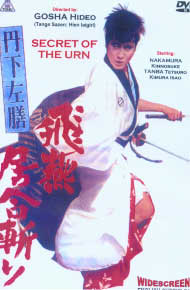Secret of the Urn (Hien Iaigiri)

Director: Hideo Gosha
Year: 1966
Production Company: Toei
Running Time: 91 minutes
From what I have read on the Internet, it appears that “Sazen” followed
in the themes and mood of the early films in the series quite closely, but
if that is the case Gosha broke out of this mold quite dramatically with
a gritty tense film full of action and political corruption. It too incorporates
the basic plot of the missing urn that the Yagyu family is looking for, but
it takes almost everything else and turns it on its head. The narrative is
much more complex as are the characters and though Sazen and Ofuji are in
the end basically good people, they are much rougher around the edges with
more than a hint of cynicism and larceny in their souls.

This was Gosha’s third samurai film and he was to become one of the premier
directors of this genre over the next decade. The time of the noble samurai
hero was somewhat passé by the mid-60’s and here Gosha creates a classic
anti-hero – embittered, isolated, untrusting, but still with a sense of justice
buried somewhere beneath his encrusted anger at the world. He has reason.
As a member of a high-ranking clan, Tange (Nakamura Kinnosuke) is summoned
by his lord to perform a duty. The lord is in the middle of whipping a confession
out of a woman – she has admitted to being a spy and has named her accomplice
in the clan. The accomplice is the fiancé to Hagino, a good female
friend of Tange’s and he is ordered to kill this man in a duel and spare
the honor of his friend. He takes the man out and issues him a challenge
to a duel, but the fellow tricks Tange by asking him to assist him in committing
seppuku where upon he stabs Tange in the eye. Suddenly a group of men appear
over the hilltop and march down and cut off Tange’s arm and throw him into
a ditch for dead.

The Yagyu clan is “honored” by the Shogun by being requested to pay for the
rebuilding of a sacred temple, but this is a ploy by one of his ministers,
Gunraku, to bankrupt and ruin them because he knows they don’t have the funds
to pay for such a thing. Lord Yagyu (Tetsuro Tamba) learns that the urn has
the secret to a huge amount of money and sends his brother Genzaburo to collect
it at their summer home. Gunraku hears of this and sends his own men to intercept
the urn and take it from them. A sneak thief hears this plan and tells his
sister, Ofuji (Keiko Awaji), a lower class geisha and they decide to try
and steal it as well.

These forces all come together at the river bank in a bloody mêlée
of killing and "who has the urn" as it jumps from one hand to another before
if finally lands in the hands of a young orphan boy who speeds away with
men in close pursuit. The boy runs into a small hut and his pursuers are
right behind him, but suddenly they come flying out followed by a gnarled
one-eyed-one armed man roaring at them to stop. Genzaburo demands the urn
but Sazen refuses to hand it over and escapes with a boat provided by Ofuji
and her brother.

Sazen is now a very different man than the one who went to kill his friend’s
fiancé – disfigured, shunned by all as a monster and deserted by his
clan, he is out only for himself with loyalty to no one and he openly mocks
the samurai code of honor. In order to get the urn away from Sazen, Ofuji
and her brother attempt various ploys such as getting him drunk or seducing
him but this is interrupted by a slew of ninja’s who have tracked them down
to kill them. Instead they meet the blade of Sazen as he cuts through them
one after another. From this point on the film becomes largely an action
triangle with both sides trying to get the urn from Sazen while he is most
interested in getting to know Ofuji better.

In the end of course he does the right thing and fights his way through hoards
of ninja’s to recover the urn and return it to its rightful owner. This is
an excellent fast moving action film without an ounce of fat in it and what
one would have thought would be the beginning of a series instead became
the end of Tange Sazen films for years to come (though Goshi was to remake
this film for television in 1982).

My rating for this film: 7.5







